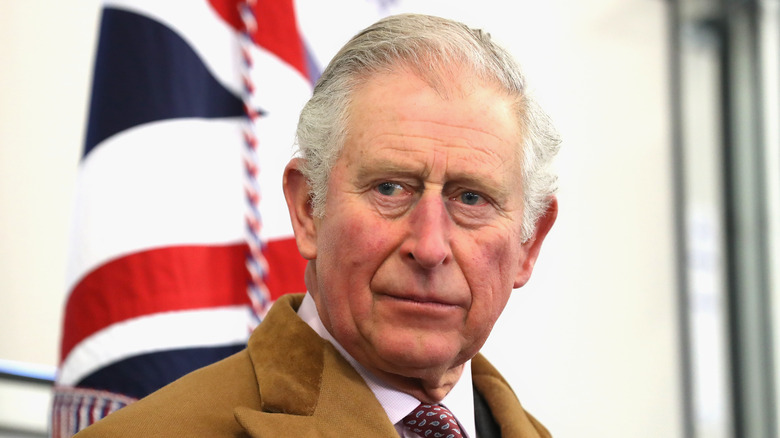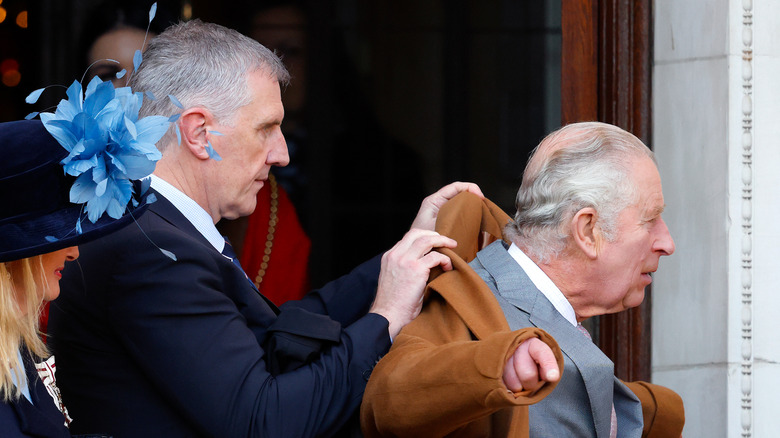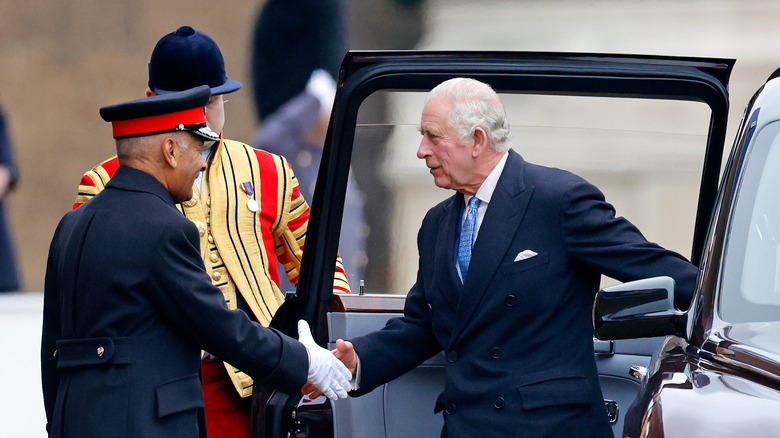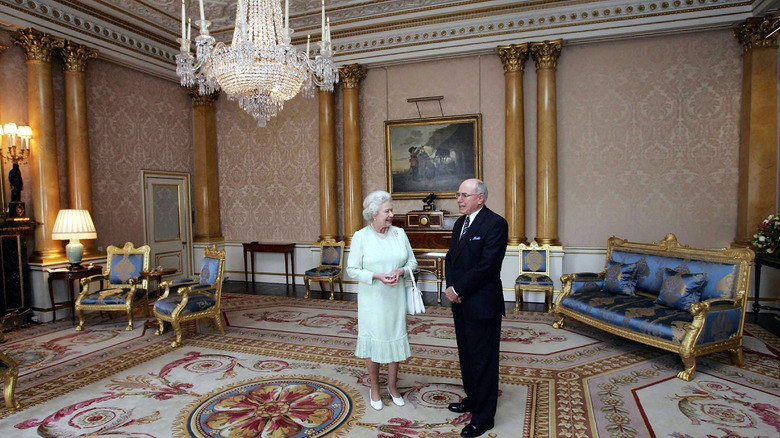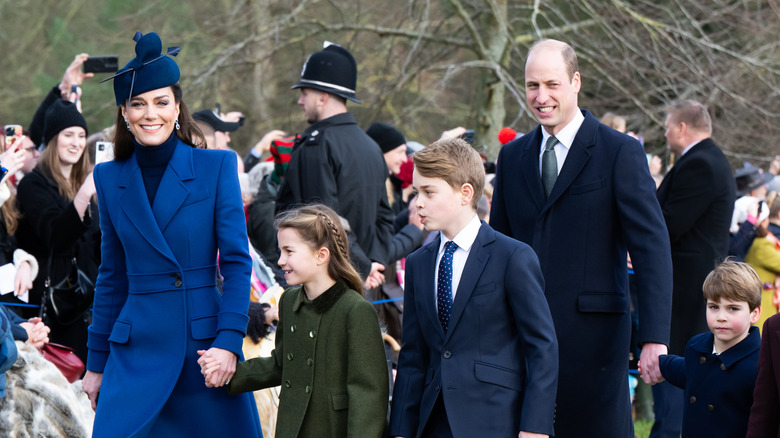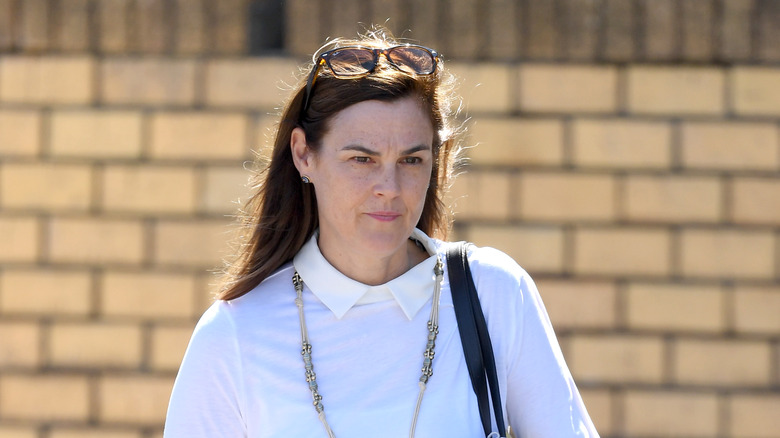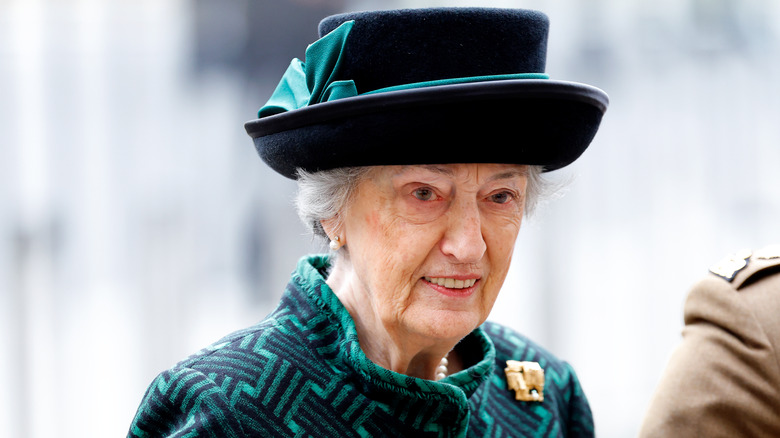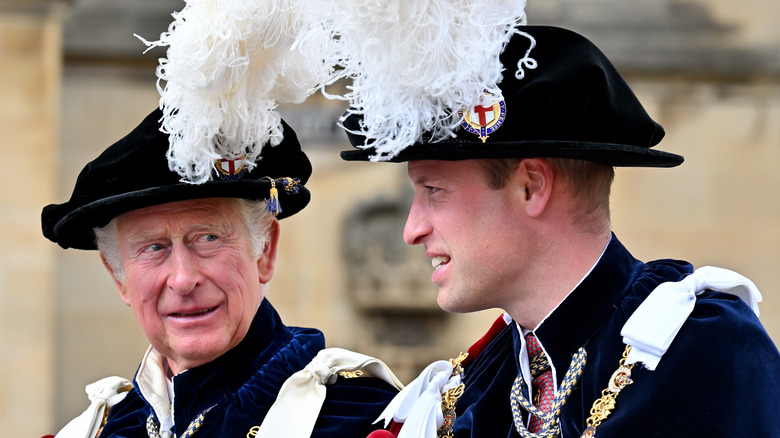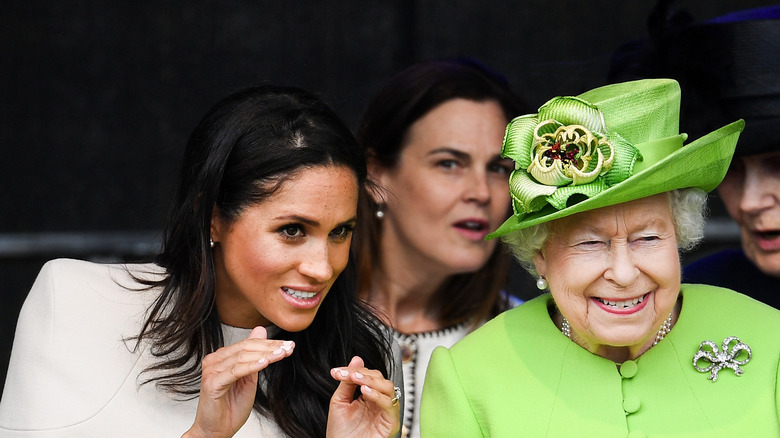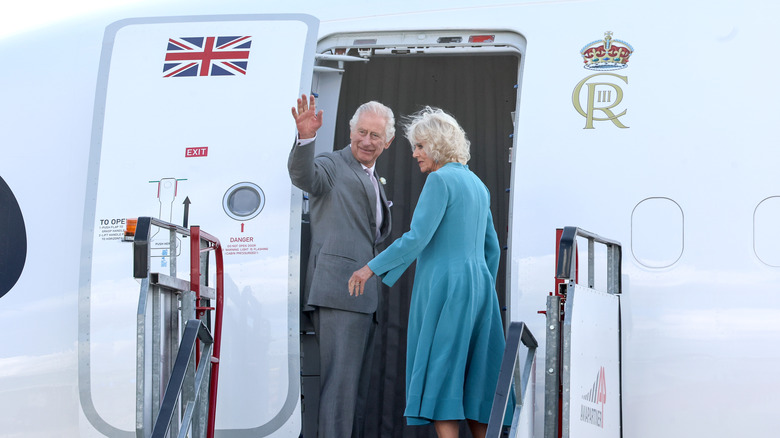What It's Really Like Being A Royal Aide And Working For The Firm
From the outside, the royal family is a vision. It's a group of people who always look amazing (despite sometimes repeating outfits), put their best foot forward, and are painfully polite. But the royal family doesn't put on this charade on their own. Despite what it looks like from the outside, the inner workings of the royal family are incredibly complex with several moving parts. Said moving parts are over 1,000 people who work for the Firm, doing their best to keep this famous and important institution running as perfectly as possible at all times.
Unfortunately for curious minds, the royal employees are rarely seen or heard, keeping their opinions and anecdotes largely to themselves. However, on occasion, a former employee will share what it's like on the inside of the Firm, and all that information is rounded up below. From the people who've lived it, here's what it's really like being a royal aide, from the intense workload to the etiquette required to the personal relationships developed with members of the family.
It's a lot of work
The royal family is a multi-million dollar business. Per their financial report from the fiscal year 2022-23, the Sovereign Grant was £86.3 million, and that didn't cover all of their expenses. This cost is just one illustration of how much work it takes to run the Firm. Another is the actual labor put in by the royal aides. Royal aides work under one of five main departments, doing anything from official correspondence to arranging flowers. "I always think of this organisation as lots of businesses under one roof. Because of that, you get to see a very diverse range of business processes and how people interact," one aide said of the operation, per the official royal website.
A royal aide is not just a part-time job or an occupation that one takes to get by — the royal family expects their staff to treat their appointment like a career they care about. And former and current royal aides will attest that much is expected of them to keep the business running. "We don't just stand still, we recognise when there's an opportunity to adapt and do so with real enthusiasm," another aide said on the website. Some positions are only expected to work 37.5 hours per week, but none of those hours are idle.
Aides have to sign NDAs
While working for the Firm, the aides get rather close to the royals (more on that later). As such, they see members of the royal family in all states, including some of their worst. If any regular person had round-the-clock staff, there would be unsavory stories to share, but they probably wouldn't be of much interest to the public. Stories about the royal family, however, are, and employees of the Firm must sign non-disclosure agreements, or NDAs, so the royals have a legally binding document keeping their secrets safe.
Royal handlers spilling royal secrets has been an issue for the Windsors for over a century. The royal family has taken all sorts of measures to keep former employees from speaking about private matters. Though the royal family has never publicly declared when they routinely began making employees sign NDAs before working for them, it likely happened after one of Princess Diana's former employees Patrick Jephson wrote a tell-all book. That said, some former royal aides find the NDAs harmful. For example, one former aide, who has accused Meghan Markle of bullying staff members, cannot share more details due to the agreement they signed. "The only way to end it once for good is for us to be allowed to speak, and for the palace to firmly reject their lies," they said to The Times in 2022.
Aides have to learn proper etiquette
If there's one thing that can be expected from the royal family, it's etiquette. The Windsors are known for maintaining proper poise in all situations, particularly formal events, and that extends to their guests and staff. Aides have to learn how to politely interact with the royal family, which includes only shaking a royal's hand if the royal extends the offer first. Anyone who does get the chance to shake a royal's hand also needs to know the proper form. As former royal butler Grant Harrold told Not Quite Nigella, "Extend your hand at the right angle with your thumb pointing up. Touch thumb joint to thumb joint. Once you make contact put your thumb down gently. Wrap your fingers around the other persons [sic] palm. Two to three pumps is enough. The handshake should not be crushing or limp but firm and friendly."
Other important etiquette tips include keeping proper posture, always passing salt and pepper together, and putting cream on a scone before jam. Of course, most royal aides will not have the opportunity to pass salt and pepper or eat a scone with the family members, but it's good for them to know the protocol should the situation arise.
The aides are allowed to stay at the palace if necessary
Working for the royal family sometimes requires keeping odd hours. The sun never sets on the United Kingdom, and they need staff to accommodate. Luckily for the staff, if they do have to stay late or work a long shift, the royal family puts them up for the night so they don't have to drive home at an unsafe time. "I was away working a lot with a young family but the Queen made it easy, if there was an evening function I'd stay over and sleep in my own bedroom at Windsor so I didn't have to drive back to London at night," former royal aide Samantha Cohen said to the Herald Sun in 2024.
While some just take up residence for the night, other aides live at Buckingham Palace permanently. The enormous palace boasts 188 staff bedrooms, so there is plenty of room for the on-call employees. Royal staff members haven't shared a ton about living at Buckingham Palace (see the information about the NDAs), but certain aspects have been shared. For example, in 2018, the late Queen Elizabeth II's Lord Chamberlain told staff members they were no longer allowed to have pets at Buckingham Palace, reversing a rule that had been in place for centuries.
Families of the aides are invited to holidays
For all the oddities required of royal aides, there are also perks. For example, those who have to work on holidays — and many of them do — can invite their own family members to spend the occasion with the royal family. "When we were on duty at Balmoral we could bring our families, my children had summer holidays there and, when I was on duty every two years at Sandringham, they came there for Christmas, it was a beautiful time," former royal aide Samantha Cohen said to the Herald Sun.
Royal aides and family members can expect a classic holiday when spending it with the Windsors. The royal family is known for keeping years-long traditions, particularly at Christmastime. Some of the royal family Christmas traditions include traveling to Sandringham Estate for the holiday, enjoying a Christmas Eve dinner, opening gifts (including joke gifts), attending church on Christmas Day, and having Christmas Day lunch and supper. Not every royal staff member finds every tradition endearing, though. As former royal chef Darren McGrady shared with OK magazine, per the New York Post, "It was the same meal every [Christmas]. They're actually boring when it comes to festivities. They didn't do hams or anything, just traditional turkeys."
If they're good at their job, they can stay with the royal family for years
The royal family rewards loyalty. If an aide is good at their job and gets along well with the Windsors, they have the opportunity to stay at the Firm for years, or even decades. For example, former aide Samantha Cohen worked for the royal family for 18 years, former chef Darren McGrady stayed in his position for 15 years, and Lady Susan Hussey worked for Queen Elizabeth II for over 60 years. Royals will even allow certain former staff members to return to their posts after a scandal. Months after Hussey was fired for making a racist remark (more on that later), the former aide was seen at a royal event. "Lady Susan was formally asked to represent the Princess Royal at the service. She was more than happy to do so. Her official position was recorded in the order of service. It's great to see her back in the royal fold," a source told the Daily Mail.
Staying loyal to the royal family can result in hefty payment, too. For example, Sir Clive Alderton, an aide who's been with the royal family since 2006, makes around £205,000 per year, and Sophie Densham, an aide who's been with the royal family for over 10 years, makes around £90,000 per year. While significant salaries are possible, the discrepancy has led to speculation of a gender pay gap within the royal household.
They have to watch their words
There's no such thing as tenure with the royal family. As noted, it's quite possible for a royal aide to remain part of the Firm for decades, but no one is guaranteed a job. Certain missteps, such as saying something inappropriate, can cost even the longest-standing aides their jobs. In 2022, Lady Susan Hussey, one of Queen Elizabeth II's former ladies-in-waiting, resigned after making a racist remark to Ngozi Fulani, the CEO of Sistah Space, a U.K. non-profit organization. Fulani recounted the interaction on X (formerly Twitter) where Hussey asked her where she was "really" from, and the palace responded by saying, "Unacceptable and deeply regrettable comments have been made. We have reached out to Ngozi Fulani on this matter, and are inviting her to discuss all elements of her experience in person if she wishes. In the meantime, the individual concerned would like to express her profound apologies for the hurt caused and has stepped aside from her honorary role with immediate effect," as reported by CNN.
Hussey seemingly left on decent terms, though. After Michael Fawcett, one of King Charles' former royal aides, left the Firm for a variety of improprieties, he was offered a severance package and an agreement to still plan parties for King Charles. As noted, Hussey was able to return to work for the royal family after a short period of time.
Aides have to understand how the royal family works
The royal family has a litany of aides for a reason. There's a lot that goes into keeping the operation afloat. As former royal employee Simon Morgan told Town & Country, "You're there to support them like any other support role, to help them do their job." Part of supporting them means understanding the inner workings of the royal family, such as their family tree, who lives where, and the line of succession. All of that knowledge is essential to being a good aide. Luckily for anyone who gets hired, they aren't expected to know that information going in. All new hires go through orientation before formally beginning duties. "You go out with experienced protection officers, they show you around all the royal residences, you go through the family members, who's on what team, how the structure of the household works, and the chain of command that you have within that role," Morgan explained (Morgan worked as royal security, so it's likely that not every royal employee has as thorough of an orientation).
Working for the royal family may be difficult, but those who can survive are better off in their career for it. As Morgan noted, after he left the firm and sought other employment, he was told that simply working for the royal family was qualification enough for another opportunity.
Aides get to know the royal family well
Aides are involved in nearly every aspect of the royal family's life. From preparing their food to helping them craft messages to the public during times of personal hardship, the royal staff has to take an interest in getting to know the Windsors. But since they spend so much time together, it's not difficult for the aides to grow close to the royal family. The royals reciprocate the interest, though, as former staffers have reported the royal family asks about their aides' personal lives, as well.
In an interview with former royal aide Samantha Cohen for the Herald Sun, the staffer shared that over the nearly 20 years she spent working for Queen Elizabeth II, she and the monarch formed a strong bond. "The Queen and I used to talk a lot. I miss her, she was a special woman," Cohen said. The bond Cohen and Queen Elizabeth shared was made further evident in the special insight she revealed. "The Queen had no ego, she was so comfortable in herself, yet she loved it when things went wrong," Cohen said, describing a side of the queen the public might not have expected. "If a cake was not cutting, or a plaque didn't unveil, because everything was so perfectly organised it spiced her life up when things went wrong."
Royal aides are not permitted to gossip
Gossip is the enemy of the royal family, and they take every measure possible to ensure their business isn't talked about more than it already is. As noted, the royal family has staff members sign non-disclosure agreements to curb gossip from getting to the media, and they also take care to only hire people they can trust.
Before royal aides are even privy to gossip, they have to pass a rigorous hiring process. For example, anyone who wants to be part of the Windsors' security team must have experience as a police officer, submit a written application, and go through an interview. "If you pass the interview, you'll then attend a two-day selection course whereby you're tested to see if you have the mindset to be a protection officer. They give you the day from hell and assess you on how you react to it," Simon Morgan told Town & Country of the steps required to work for the royals. Those selected after that go on to take a five-week class on security, and anyone who fails the class does not join the royal security force. Not all positions require such extreme vetting measures, but the firm doesn't hire just anyone, and reliability and discretion are among the top traits that they seek in their staff to prevent gossip and other undesirable behaviors.
They get to experience a luxurious life
The easiest way for commoners to live like royalty is to work for the royal family. A perk for working as an aide for the Firm is experiencing the lifestyle that the Windors live. Whether it's traveling with the family or simply spending the night at Buckingham Palace, royal employees get a glimpse of the high life as part of the job. "You find yourself in places you wouldn't normally have access to. You are very fortunate to be in these positions, to travel by private charter, or travel first class, or to be on super-yachts, or to eat in some of the nicest restaurants the world can offer ... " Simon Morgan told Town & Country of working for the royal family.
Some royal employees get invited to alternative royal properties, too. For example, the former facialist of Camilla, Queen Consort, has spent the night at both Sandringham and Highgrove. "They were the most amazing rooms, very special. I was treated to breakfast. It was all laid out for me in the morning, so I didn't have to ask for anything," Deborah Mitchell said to Insider of her time spent at the properties. But employees are best to remember that none of the luxuries experienced while working for the royal family are permanent. As Morgan added, "It's just a job. You go back to your two-up two-down home and life carries on."
